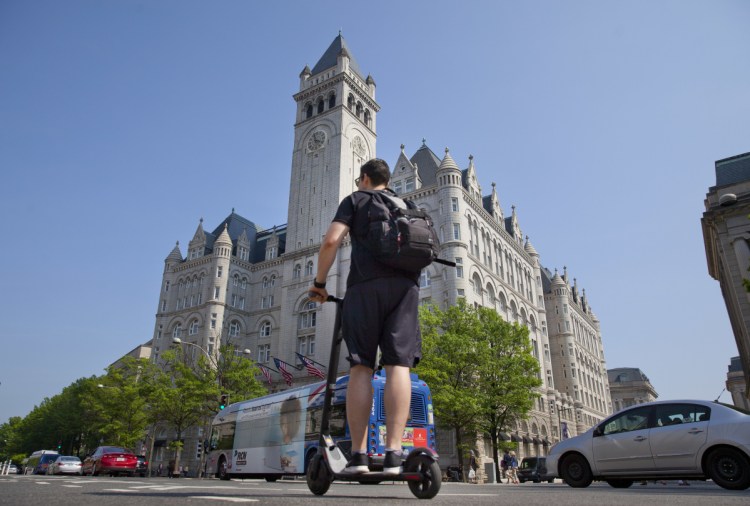SAN FRANCISCO — Scooter rental start-up Bird wants customers to know its electric gadgets are not toys. It has produced educational videos and in-app notices to remind people to ride safely. It has given away helmets to anyone who wants one. And before a customer can even unlock a scooter, he or she has to agree to follow the rules of the road.
Still, many riders aren’t getting the message.
In cities where the scooters have launched, riders continue to flout local helmet rules, ride on sidewalks and disobey traffic laws.
Last week in Santa Monica, Calif., a man on a Bird scooter collided with a Honda sedan after zipping through a stop sign, resulting in what Santa Monica police described as a moderate head injury. The man was not wearing a helmet.
The struggle to get riders to keep themselves and others safe highlights one of the biggest challenges faced by the nascent scooter rental industry: How do you get people to behave responsibly when you give them something that looks – and rides – like a toy?
In every city with electric scooters, helmet use is low, and even those who know they should wear a helmet while riding often don’t.
“I don’t feel like carrying a helmet around with me just for the chance I might want to ride one that day,” said Gabriel Marshall, 28, who uses scooter rentals to commute in San Francisco because he thinks it’s more affordable – and fun – than taking the bus or UberPool.
He’s not alone.
“What bothers me is I walk around Santa Monica every day and I’ve never seen any of the scooter riders with a helmet,” said Dr. Wally Ghurabi, medical director of the Nethercutt Emergency Center at UCLA Medical Center in Santa Monica. “They seem to think they’re invincible.”
The city’s Fire Department has recorded at least 12 incidents involving Bird scooters since they appeared in Santa Monica last year. At nearby UCLA Medical Center, the ER has seen a few scooter incidents, mostly involving multiple abrasions and scrapes.
Backed with more than $100 million in venture capital, Bird launched in its hometown of Santa Monica last September and has since flooded the streets of cities such as San Francisco, San Diego and Nashville with rechargeable scooters capable of traveling up to 15 mph. Competitors LimeBike and Spin have followed similarly, charging customers a dollar to unlock the scooters and about 15 cents a minute. There are no formal parking spots – riders find the nearest scooter via a mobile app, and are encouraged to leave them on the sidewalk when they’re done.
Customers must have a valid credit card and driver’s license, a measure intended to ensure accountability and familiarity with road rules. Those who request a helmet from Bird receive a free one by mail; 22,000 have already been sent out, said company spokesman Kenneth Baer.
“Bird clearly urges riders not to ride on the sidewalk, but to ride on the road and in bike lanes where available,” Baer said.
Bird says it will shut down accounts of misbehaving users, but the company wouldn’t specify how many customers it has deactivated or why it has cracked down on specific accounts. “While we’ve had very few problems, we thoroughly investigate any reports of abuse and deactivate users when necessary,” Baer said.
But the specter of deactivation, the promise of free helmets and the frequency of in-app reminders have not been enough to convince all customers that they must follow the rules.
“I’m sure the safety messaging in the app was very comprehensive, but they didn’t actually make me read any of it,” said Rivers Langley, 31, of East Hollywood, who rode a Bird scooter without wearing a helmet.
Send questions/comments to the editors.



Comments are no longer available on this story